On Thursday, February 8, join the Center on Reproductive Health, Law, and Policy at UCLA Law for an in-person conversation about CA Senate President pro Tempore Emeritus Toni G. Atkins' important contributions to advancing reproductive rights and justice in California.
Register here: https://forms.office.com/r/MbDEDXuHGj
We will also discuss her inspiring path to becoming the first woman and the first openly LGBTQ person to lead the California Senate, and the first person in 150 years to lead both houses of the California Legislature.
The event will also feature Assemblymember Rick Chavez Zbur, Chief External Affairs Officer for PPLA Celinda Vazquez, and Executive Director of CRHLP Melissa Goodman.
Following the discussion, students will have the opportunity to network with the speakers, as well as staff from the Center on Reproductive Health, Law, and Policy and our partners at Planned Parenthood Los Angeles. All students are encouraged to join to learn more about pursuing a career in public service, particularly one dedicated to advancing reproductive and gender justice. Free food and drink from Fundamental Catering will be provided.
We invite you to join us for an inspiring evening at UCLA Law School!
Register here: https://forms.office.com/r/MbDEDXuHGj
More about CA Senate President pro Tempore Emeritus Toni G. Atkins' historic career:
Following the Supreme Court's decision to overturn Roe v. Wade, Senator Atkins has played an integral role in expanding access to reproductive health in California, including sponsoring SB 487 to strengthen protections for California health care providers who provide abortion care services and gender-affirming care services. SB 487 follows more than a decade of work by Pro Tem Atkins to widen access to reproductive health care in California. As a director of clinical services for a women’s reproductive health clinic in the 1990s, she learned firsthand how essential access to safe healthcare is for women and people of all ages, and has been a fierce champion of protecting and expanding access to reproductive rights and services for decades.
Directions and Parking for Events at UCLA School of Law
UCLA School of Law
385 Charles E. Young Drive East
Los Angeles, CA 90095-1476
Self-service, pay-by-space parking is available from pay stations located throughout campus. Pay-by-space parking closest to the Law Building is available at selected entrances to parking structures 2 and 3, and by the Law Building along Charles E. Young Drive East, as shown on this map.
Price typically ranges from $1 for 20 minutes to $20 for all day.
We recommend that you allow 15 minutes for parking
This year, the Annual Update Legacy Gala will bring together over 300 people, elected officials, judges, academics, celebrities, and others for a cocktail hour and formal seated dinner in honor of our founder Chuck Williams, who passed away in April 2023.
Outstanding new members boost law school faculty and administration in 2023–24.
New Tenure-Track Faculty
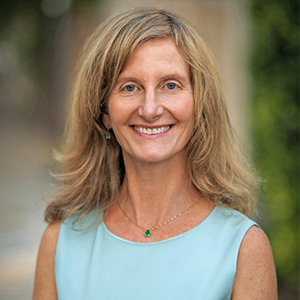 ARIELA GROSS
ARIELA GROSS
Distinguished Professor of Law
New Senior Leaders
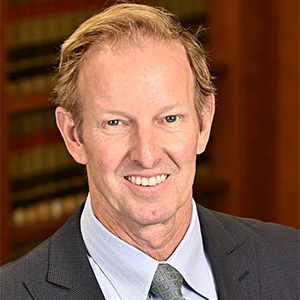 TIMOTHY CASEY
TIMOTHY CASEY
Director of Curricular Administration and Professor from Practice
Tim Casey will teach Professional Responsibility and provide support for the non-senate law faculty. He started his teaching career at Columbia Law School, where he established a Criminal Practice Clinic and received the Presidential Award for teaching. He also held an appointment as a professor of law at Case Western Reserve University. And he received a Fulbright award for research and teaching in Buenos Aires, Argentina.
Most recently, Casey served as the director of the STEPPS Program and professor in residence at California Western School of Law, where he oversaw an innovative program in legal ethics and lawyering skills. He also was a visiting professor at the University of San Diego School of Law. Before entering legal academia, he practiced law as a public defender in New York City.
Casey is an internationally recognized expert in experiential legal education. His research interests include legal ethics, surveillance and civil liberties, problem-solving courts and experiential pedagogy. He is a co-author of Legal Ethics in the Practice of Law (Carolina Academic Press, Fifth Edition, 2019), and his scholarship has appeared in law reviews including UC Davis Law Review and SMU Law Review. He serves as chair of the Legal Ethics Committee of the San Diego County Bar Association, a board member for local and international non-profit organizations, and a member of the editorial board for the peer-reviewed Clinical Law Review.
He received his B.A. from Boston College, J.D. from UC Law San Francisco and LL.M. from Columbia Law School.
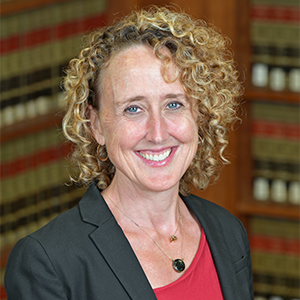 HANNAH GARRY
HANNAH GARRY
Executive Director of the Promise Institute and Professor from Practice
Hannah Garry joins UCLA Law as executive director of the Promise Institute for Human Rights and professor from practice. Garry has devoted her legal career to seeking justice and accountability for human rights abuses and atrocity situations across the globe, while making the U.S. a destination for the study and practice of human rights law.
She joins UCLA Law from USC Gould School of Law, where she was clinical professor of law and founding director of the International Human Rights Clinic for 12 years. Her areas of teaching and scholarship include international criminal law, transitional justice, international human rights law and international refugee law. She has supervised student attorneys in the clinic on cases and projects nationally and internationally that address atrocity crimes, refugee rights, fair trial rights, gender justice, human trafficking and systemic racism.
Garry’s career as an international human rights advocate, scholar and teacher took root when she was a graduate student at Oxford University’s Refugee Studies Centre. After graduation, she was hired by Oxford as a field researcher visiting refugee camps throughout Uganda and Kenya for two years where she witnessed and documented first-hand the abuses refugees endure in exile while under the protection of the international community.
Garry has held many other academic and expert legal advisor positions, including in international criminal courts and leading human rights organizations, and she has been quoted widely in major media outlets. Last year, she was a Fulbright Scholar at the University of Oslo Law’s PluriCourts Centre in Norway.
Garry earned her J.D. from UC Berkeley and master’s in international affairs from Columbia University.
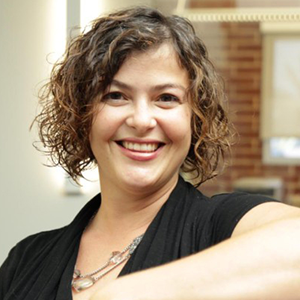 MELISSA GOODMAN
MELISSA GOODMAN
Executive Director of the Center on Reproductive Health, Law, and Policy
Melissa Goodman joins UCLA Law as the inaugural executive director of the Center on Reproductive Health, Law, and Policy after a five-year tenure as the legal and advocacy director for the ACLU of Southern California. There, Goodman led 60 attorneys across Southern California and oversaw the department’s visioning and strategy, strategic planning, intersectional issue and cross-team collaboration and resource allocation. In doing so, she helped lead statewide legislative, electoral and organizing strategy. She also co- chaired the national ACLU’s Gender Justice Task Force.
Goodman previously spent a decade as the ACLU SoCal’s Audrey Irmas Director of the LGBTQ Gender and Reproductive Justice Project, and as a senior litigation and policy counsel for reproductive and LGBTQ rights at the New York Civil Liberties Union. In those roles, she led and participated in reproductive justice, LGBTQ and gender equity litigation, as well as policy advocacy campaigns. Along the way, Goodman led or co-counseled an array of high-profile cases, including those involving pregnant unaccompanied immigrant minors; gay, bisexual and transgender prisoners; and same-gender couples.
Goodman clerked for Judge Frederic Block of the U.S. District Court for the Eastern District of New York. She earned her B.A., magna cum laude, from New York University and her J.D. from NYU School of Law.
New Lecturers
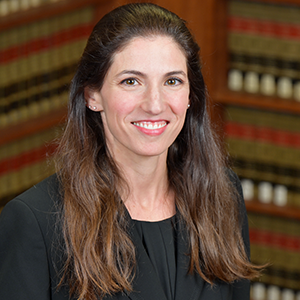 EMILY CHURG
EMILY CHURG
Lecturer in Law
Emily Churg teaches Legal Research and Writing. She previously practiced complex commercial litigation at WilmerHale and ran her own bar exam preparation company. She has also taught legal writing at USC Gould School of Law and undergraduate writing at Arizona State University.
She earned her B.A., with honors, from UC Santa Cruz; her Ph.D. in rhetoric, composition and linguistics from Arizona State; and her J.D., Order of the Coif, from UC Davis School of Law. After law school, she clerked for Judge S. James Otero of the U.S. District Court for the Central District of California.
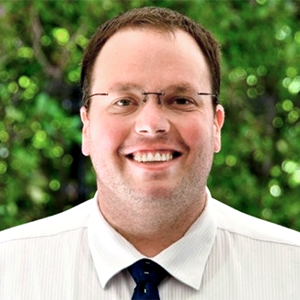 THOMAS WANEBO
THOMAS WANEBO
Lecturer in Law
Thomas Wanebo teaches Legal Analysis, Writing, and Research for LL.M. students. He currently works as a trial attorney at Neighborhood Legal Services of Los Angeles County, defending low-income families against eviction. He began his career as a litigation associate at Irell & Manella in Los Angeles.
Wanebo earned his B.A. from Colorado State University and his J.D. from UCLA Law, where he was a senior editor of the UCLA Law Review. His publications include the article “Remote Killing and the Fourth Amendment: Updating Constitutional Law to Address Expanded Police Lethality in the Robotic Age,” which appeared in the UCLA Law Review.
New Fellows
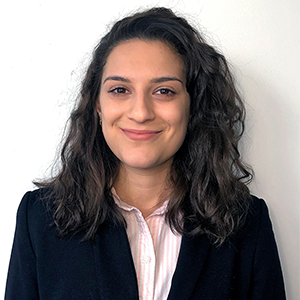 MELODI DINCER
MELODI DINCER
UCLA Institute for Technology, Law and Policy Fellow
Melodi Dincer will join UCLA Law in January 2024 as a fellow with the UCLA Institute for Technology, Law and Policy. Her work focuses on helping social movements fight algorithmic violence and build transformative futures.
She was previously an appellate advocacy fellow with the Electronic Privacy Information Center and has been a legal research fellow and clinical supervising attorney at NYU School of Law, where she earned her J.D. She earned her B.A. from Brown University.
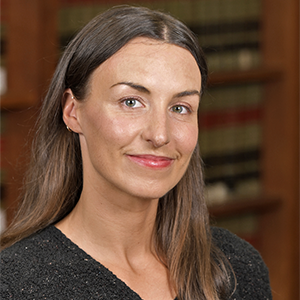 RUTHIE LAZENBY
RUTHIE LAZENBY
Shapiro Fellow in Environmental Law and Policy
As the Shapiro Fellow in Environmental Law and Policy for 2023–25, Ruthie Lazenby will be focusing on energy law and regulation. She was previously a staff attorney in the Environmental Justice Clinic at Vermont Law School and a legal fellow in the environmental justice program at New York Lawyers for the Public Interest.
She earned her B.A. from Wesleyan University and her J.D. from Yale Law School, where she was an editor of the Law and Political Economy Blog.
This year, the Supreme Court of the United States delivered major decisions on affirmative action, voting rights, free speech and Indigenous sovereignty, among other issues.
UCLA School of Law experts stepped in to break down the impact of the term in a variety of places: “Whither the Court: The Allan C. Lebow Annual Supreme Court Review” program, a webinar titled “From the Frontlines: The Supreme Court Rulings on Affirmative Action, LGBTQ Rights, and Student Debt,” public writings and even social media videos.
UCLA’s Health Law and Policy Program is pleased to present The Future of Human Rights and Justice-Centered Ethics in Epidemic Response: From HIV to COVID and Beyond conference. This initiative brings together researchers, community organization leaders, and current and former health officials to discuss legal and governance mechanisms for ensuring that measures adopted to mitigate the impacts of epidemics are consistent with human rights and justice-centered public health ethics. It is cosponsored by the Health Science Center, School of Law, and School of Medicine of Texas A&M University, and by the Williams Institute and the Promise Institute for Human Rights.
In the decades following the emergence of HIV, advocates shaped the development of health law and policy by arguing for reforms to ensure that compulsory public health measures and legal regimes governing access to medicines were consistent with human rights protections and ethical values. The standards and procedures they championed (with partial success) emphasized the importance of individualized risk assessments, use of the least restrictive alternative, provision of supportive services, privacy and antidiscrimination protections, and affirmative rights to access treatment. During the Covid pandemic, policymakers relied heavily on measures that put the onus on individuals to change their behaviors, often in the absence of adequate legal protections or supports. Moreover, existing legal mechanisms and ethical frameworks were insufficient to ensure equitable distribution of PPE, diagnostics, vaccines, and treatments within the United States and globally. Amid ongoing efforts to reform international, national, state, local, tribal, and territorial laws, this initiative aims to develop, disseminate, and implement ethical and human rights frameworks to guide the future of epidemic response.
The Initiative Co-Chairs are Lindsay F. Wiley and William Sage.

UCLA’s Health Law and Policy Program is pleased to present The Future of Human Rights and Justice-Centered Ethics in Epidemic Response: From HIV to COVID and Beyond conference. This initiative brings together researchers, community organization leaders, and current and former health officials to discuss legal and governance mechanisms for ensuring that measures adopted to mitigate the impacts of epidemics are consistent with human rights and justice-centered public health ethics. It is cosponsored by the Health Science Center, School of Law, and School of Medicine of Texas A&M University, and by the Williams Institute and the Promise Institute for Human Rights.
In the decades following the emergence of HIV, advocates shaped the development of health law and policy by arguing for reforms to ensure that compulsory public health measures and legal regimes governing access to medicines were consistent with human rights protections and ethical values. The standards and procedures they championed (with partial success) emphasized the importance of individualized risk assessments, use of the least restrictive alternative, provision of supportive services, privacy and antidiscrimination protections, and affirmative rights to access treatment. During the Covid pandemic, policymakers relied heavily on measures that put the onus on individuals to change their behaviors, often in the absence of adequate legal protections or supports. Moreover, existing legal mechanisms and ethical frameworks were insufficient to ensure equitable distribution of PPE, diagnostics, vaccines, and treatments within the United States and globally. Amid ongoing efforts to reform international, national, state, local, tribal, and territorial laws, this initiative aims to develop, disseminate, and implement ethical and human rights frameworks to guide the future of epidemic response.
The Initiative Co-Chairs are Lindsay F. Wiley and William Sage.

There are nearly 1.3 million LGBT immigrants who live in the U.S., including over 300,000 who live in California. Join us on September 27th to learn about the contributions, experiences, and needs of California’s LGBT immigrants. We will also discuss how key areas of immigration policy impact LGBT immigrants and opportunities to improve the service landscape.
Please register for the webinar here.
Five years ago, the Williams Institute created UniTy to support the health, research, and rights of transgender and nonbinary communities. Since then, they have raised money to support organizations and to fund the first gender identity question on a large government survey, the California Health Interview Survey.
This year, the Williams Institute is partnering with the TransLatin@ Coalition to raise money and awareness at UniTy for a groundbreaking survey of transgender and nonbinary people in Los Angeles County. This survey will provide much-needed information about health, housing, economic and employment status; experiences of discrimination and harassment; and the resilience, activism, and well-being of transgender and nonbinary people in Los Angeles County. The results will be used to inform law, policy, and services locally, and serve as a model for similar efforts around the country.
This event is for people 21+ only.
The Annual Update is the Williams Institute's signature event held each spring in Los Angeles, featuring a half-day conference, the final round of our moot court competition, and a reception.
The Golden State of LGBTQ Rights: California's Role in Advancing LGBTQ Policy
This year's Annual Update will focus on California as both a microcosm of issues playing out on the national level and a policy innovator in protecting LGBTQ+ rights. The conference will take place at UCLA School of Law, and the panels will be live-streamed via Zoom.
Register to attend in person or online.
Lunch will be provided for people who register to attend in person by Friday 3/29.